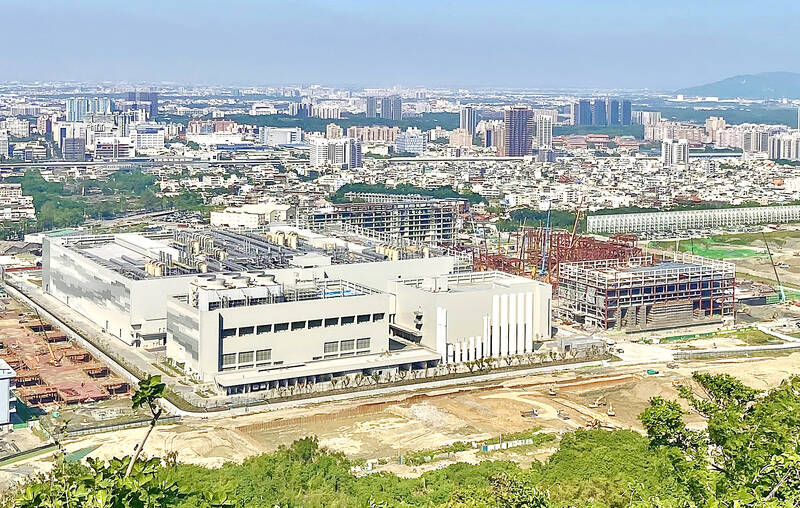Taiwan Semiconductor Manufacturing Co (TSMC, 台積電) cleared the first stage of an environmental impact assessment for its planned fourth and fifth wafer fabs in Kaohsiung, the city’s Environmental Protection Bureau said yesterday.
TSMC’s environmental impact plan regarding expanding its production site in Nanzih District (楠梓) passed during a public review yesterday morning, the bureau said in a statement.
TSMC began equipment installation at its first fab in Kaohsiung, a 2-nanometer plant known as P1, late last year. The P2 and P3 fabs are under construction.

Photo: CNA
The new facilities — P4 and P5 — would be built next to P3 and construction is expected to be completed in 2027 — as long as government approval is obtained.
During yesterday’s review, civic and environmental groups raised concerns regarding the effect of the planned facilities on Kaohsiung’s carbon reduction, green energy and water usage targets, the bureau said.
TSMC promised to power 60 percent of its Kaohsiung operations from renewable energy sources by 2030 and 100 percent by 2040, the bureau said.
Meanwhile, the city government plans to build a plant for recycling water for industrial use, helping TSMC facilities meet their goal of manufacturing chips with 100 percent recycled water, the bureau added.
TSMC also agreed to the city government’s proposal to build solar power facilities for local residents to help reduce their electricity bills, the statement said.
The chipmaker also plans to implement air pollution monitoring, it added.
The bureau said it would soon hold the final public review to complete the environmental impact assessment for the P4 and P5 facilities, which still require development, construction and other permits before the expansion can proceed.

Hon Hai Precision Industry Co (鴻海精密) yesterday said that its research institute has launched its first advanced artificial intelligence (AI) large language model (LLM) using traditional Chinese, with technology assistance from Nvidia Corp. Hon Hai, also known as Foxconn Technology Group (富士康科技集團), said the LLM, FoxBrain, is expected to improve its data analysis capabilities for smart manufacturing, and electric vehicle and smart city development. An LLM is a type of AI trained on vast amounts of text data and uses deep learning techniques, particularly neural networks, to process and generate language. They are essential for building and improving AI-powered servers. Nvidia provided assistance

STILL HOPEFUL: Delayed payment of NT$5.35 billion from an Indian server client sent its earnings plunging last year, but the firm expects a gradual pickup ahead Asustek Computer Inc (華碩), the world’s No. 5 PC vendor, yesterday reported an 87 percent slump in net profit for last year, dragged by a massive overdue payment from an Indian cloud service provider. The Indian customer has delayed payment totaling NT$5.35 billion (US$162.7 million), Asustek chief financial officer Nick Wu (吳長榮) told an online earnings conference. Asustek shipped servers to India between April and June last year. The customer told Asustek that it is launching multiple fundraising projects and expected to repay the debt in the short term, Wu said. The Indian customer accounted for less than 10 percent to Asustek’s

‘DECENT RESULTS’: The company said it is confident thanks to an improving world economy and uptakes in new wireless and AI technologies, despite US uncertainty Pegatron Corp (和碩) yesterday said it plans to build a new server manufacturing factory in the US this year to address US President Donald Trump’s new tariff policy. That would be the second server production base for Pegatron in addition to the existing facilities in Taoyuan, the iPhone assembler said. Servers are one of the new businesses Pegatron has explored in recent years to develop a more balanced product lineup. “We aim to provide our services from a location in the vicinity of our customers,” Pegatron president and chief executive officer Gary Cheng (鄭光治) told an online earnings conference yesterday. “We

LEAK SOURCE? There would be concern over the possibility of tech leaks if TSMC were to form a joint venture to operate Intel’s factories, an analyst said Taiwan Semiconductor Manufacturing Co (TSMC, 台積電) yesterday stayed mum after a report said that the chipmaker has pitched chip designers Nvidia Corp, Advanced Micro Devices Inc and Broadcom Inc about taking a stake in a joint venture to operate Intel Corp’s factories. Industry sources told the Central News Agency (CNA) that the possibility of TSMC proposing to operate Intel’s wafer fabs is low, as the Taiwanese chipmaker has always focused on its core business. There is also concern over possible technology leaks if TSMC were to form a joint venture to operate Intel’s factories, Concord Securities Co (康和證券) analyst Kerry Huang (黃志祺)